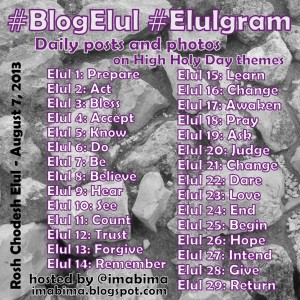Everyone has heard of the Second Commandment:
ג לֹא-תַעֲשֶׂה לְךָ פֶסֶל, וְכָל-תְּמוּנָה, אֲשֶׁר בַּשָּׁמַיִם מִמַּעַל, וַאֲשֶׁר בָּאָרֶץ מִתָּחַת–וַאֲשֶׁר בַּמַּיִם, מִתַּחַת לָאָרֶץ. 3
Thou shalt not make unto thee a graven image, nor any manner of likeness, of any thing that is in heaven above, or that is in the earth beneath, or that is in the water under the earth;
The eyes are considered very untrustworthy – in fact, we are ordered to wear fringes on our clothing as a reminder to keep our eyes in check:
לט וְהָיָה לָכֶם, לְצִיצִת, וּרְאִיתֶם אֹתוֹ וּזְכַרְתֶּם אֶת-כָּל-מִצְוֹת יְהוָה, וַעֲשִׂיתֶם אֹתָם; וְלֹא-תָתוּרוּ אַחֲרֵי לְבַבְכֶם, וְאַחֲרֵי עֵינֵיכֶם, אֲשֶׁר-אַתֶּם זֹנִים, אַחֲרֵיהֶם. 39
And it shall be unto you for a fringe, that ye may look upon it, and remember all the commandments of the LORD, and do them; and that ye go not about after your own heart and your own eyes, after which ye use to go astray;
The word that is demurely translated here as “go astray” is actually “prostitute yourselves”. Moshe Rabeinu does not mince words here. If we follow our eyes, we are guaranteed to get ourselves into spiritual, moral and quite possibly physical trouble. If you get tired of watching Downton Abbey, try reading The Book of Judges, The Book of Samuel (featuring King David!) and The Book of Kings (both I and II) for the kind of trouble Jews have been getting themselves into over the centuries, mostly by following their eyes.
But wait, there’s more! A few years ago I read a wonderful article by Chief Rabbi Lord Sacks, in which he argues that G-d is found in words, in the idea of our personhood and free will, and that is why speech is predominant over vision in Judaism.
We are the only animal that can speak, and also the only one that has free will, guilt and transcendence. On the flip side, the evil we can create in the world is unmatched anywhere in the animal kingdom. The whole concept of personal responsibility is directly related to our ability to speak, communicate with one another and create ideas that did not exist before.
In the vision of the prophet Elijah, he sees fierce storms and earthquakes and fire – all very impressive. But then:
יב וְאַחַר הָרַעַשׁ אֵשׁ, לֹא בָאֵשׁ יְהוָה; וְאַחַר הָאֵשׁ, קוֹל דְּמָמָה דַקָּה. 12
and after the earthquake a fire; but the LORD was not in the fire; and after the fire a still small voice.
While an image may be worth a thousand words, in the end, we do require words to convey the fulness of our ideas.
Do you agree?

